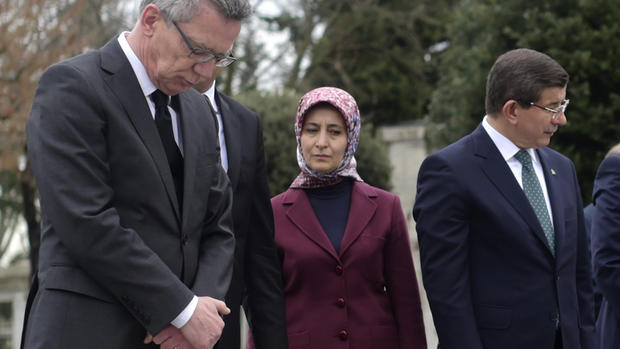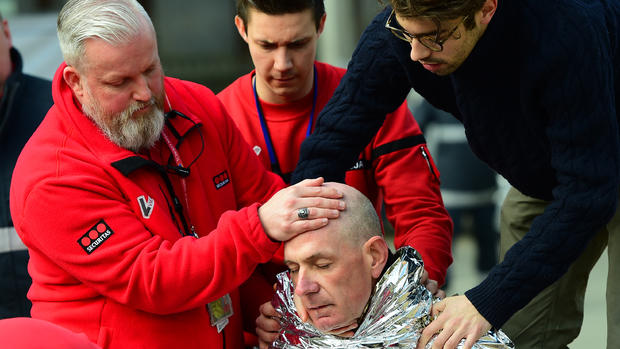Turkey sweeps up ISIS suspects after Istanbul bombing
ISTANBUL -- Turkish police have arrested five people suspected of direct links to the deadly suicide bombing that killed 10 Germans in Istanbul's main tourist area, officials said Wednesday.
More than a dozen other suspected Islamic State of Iraq and Syria (ISIS) militants were detained Wednesday in other parts of the country and 59 a day earlier, but officials say they don't appear to be tied to Tuesday's attack just steps away from the Blue Mosque in Istanbul's historic Sultanahmet district.
One suspect with a link to the attack was detained in Istanbul late Tuesday, Interior Minister Efkan Ala said during a news conference with his German counterpart. He didn't provide further details.
Turkish media said police raided a home in an affluent Istanbul neighborhood, briefly detaining one woman suspected of links to ISIS, although it wasn't clear if she was the suspect Ala was referring to. The Hurriyet newspaper said the woman was detained because a mobile phone - which she had reported stolen - had been used to call the bomber. The paper said she was released after questioning.
Hours later, Prime Minister Ahmet Davutoglu announced the arrest of four other people as part of the investigation. He didn't provide further details about them.
Turkish authorities have identified Tuesday's bomber as a Syrian man born in 1988 who had recently entered Turkey, and officials say he had ISIS links. ISIS, however, hasn't claimed responsibility for the attack.
Turkish media, including newspapers close to the government, identified the bomber as Nabil Fadli and said he was born in Saudi Arabia. Ala confirmed reports that the bomber had registered with a refugee agency, providing fingerprints that allowed officials to quickly identify him, but said the suicide bomber wasn't on any Turkish or international watch lists for ISIS militants.
The impact of Tuesday's attack, while not as deadly as two others last year, was particularly far-reaching because it struck at Turkey's $30 billion tourism industry, which has already suffered from a steep decline in Russian visitors since Turkey shot down a Russian warplane near the Syrian border in November.
Turkish police on Wednesday arrested 13 more suspected ISIS militants, including three Russians, but it wasn't clear if those arrests were directly linked to the Istanbul bombing. The state-run Anadolu Agency said 59 people were detained on Tuesday.
The attack, which also wounded 15 other people - including Germans, a Norwegian man and a Peruvian woman - was the latest in a string of attacks by Islamic extremists targeting Westerners. On Wednesday, Davutoglu, German Interior Minister Thomas de Maiziere and other Turkish officials visited the site of the blast and placed carnations there.
Norwegian tourists Jostein and Magna Nielsen were hit by shrapnel from the bomb when it tore through a park near a landmark obelisk, and some 25 yards from the historic Blue Mosque.
"We were splattered," Magna told CBS News correspondent Holly Williams. "Our clothes, my jacket was spattered with burnt human remains."
Germany sent a team of investigators to Istanbul on Wednesday from its Federal Criminal Police Office, which is comparable to the FBI, to support Turkish authorities investigating the attack.
Germany's Foreign Ministry said the number of dead Germans in Tuesday's explosion had risen to 10, but de Maiziere said there was no sign that Germans were specifically targeted.
"According to the investigations so far, there are no indications that the attack was directed specifically against Germans, so there can't be any connection to our contribution to the fight against international terrorism," de Maiziere said.
Germany promised Tornado reconnaissance jets to aid military effort against the Islamic State group in Syria following the November attacks in Paris, and they started flying missions from the Incirlik air base in Turkey last week. It also sent a tanker aircraft, as well as a frigate to help protect a French aircraft carrier in the eastern Mediterranean.
Germany already was helping supply and train Kurdish forces fighting ISIS in northern Iraq but has not taken a direct combat role.
Ala urged Turkish citizens and visitors to go about their daily lives, insisting that the country had taken "all necessary security precautions." He said Turkey had detained as many as 220 ISIS suspects in the week prior to the attack.
De Maiziere also said: "I see no reason to refrain from traveling to Turkey" or for people already there to break off their vacations.
Top German and Turkish officials already were scheduled to meet in Berlin next week to discuss Europe's migrant crisis, in which Turkey - which borders both Syria and the European Union - is a key player. De Maiziere said those talks will now also address "the determined fight against terrorism."
"If the terrorists aimed to destroy or endanger the cooperation between partners, then they achieved the opposite," de Maiziere said. "Germany and Turkey are coming even closer together."
German Foreign Minister Frank-Walter Steinmeier said his country would not make any further immediate changes to its travel advice for Turkey but could do so as the investigation into Tuesday's Istanbul bombing progresses. The Foreign Ministry advised Germans after the attack to avoid crowds in public places and outside tourist sites in Istanbul.
The Russians were detained in the Mediterranean coastal city of Antalya, a popular destination for tourists. The state-run Anadolu Agency said the suspects were allegedly in contact with ISIS fighters in conflict zones and had provided logistical support to the group. Ten other people were detained in Turkey's third largest city, Izmir, and in the central city of Konya.
Nearly 3,000 Russians, mostly from the predominantly Muslim North Caucasus, are believed to have gone to fight alongside ISIS militants in Syria. Families of ISIS recruits and human rights activists in the Caucasus have described Turkey as the main gateway to Syria for Russian fighters. Some IS fighters of Russian origin are believed to have left ISIS to settle in Turkey, families say.
The victims of Tuesday's blast came from several different parts of Germany and included two couples. Regional authorities didn't identify them but and gave ages only for some, ranging from 51 to 75.
Joerg Manthei, a spokesman for Berlin-based travel agent Lebenslust Touristik, said all 10 of the Germans who were killed had booked their trip through its agency, as well as seven of the injured.
Turkish newspapers printed words of condolence in German.
"With you in our hearts," the Haber Turk newspaper read. "Your pain is our pain" Vatan newspaper said.

